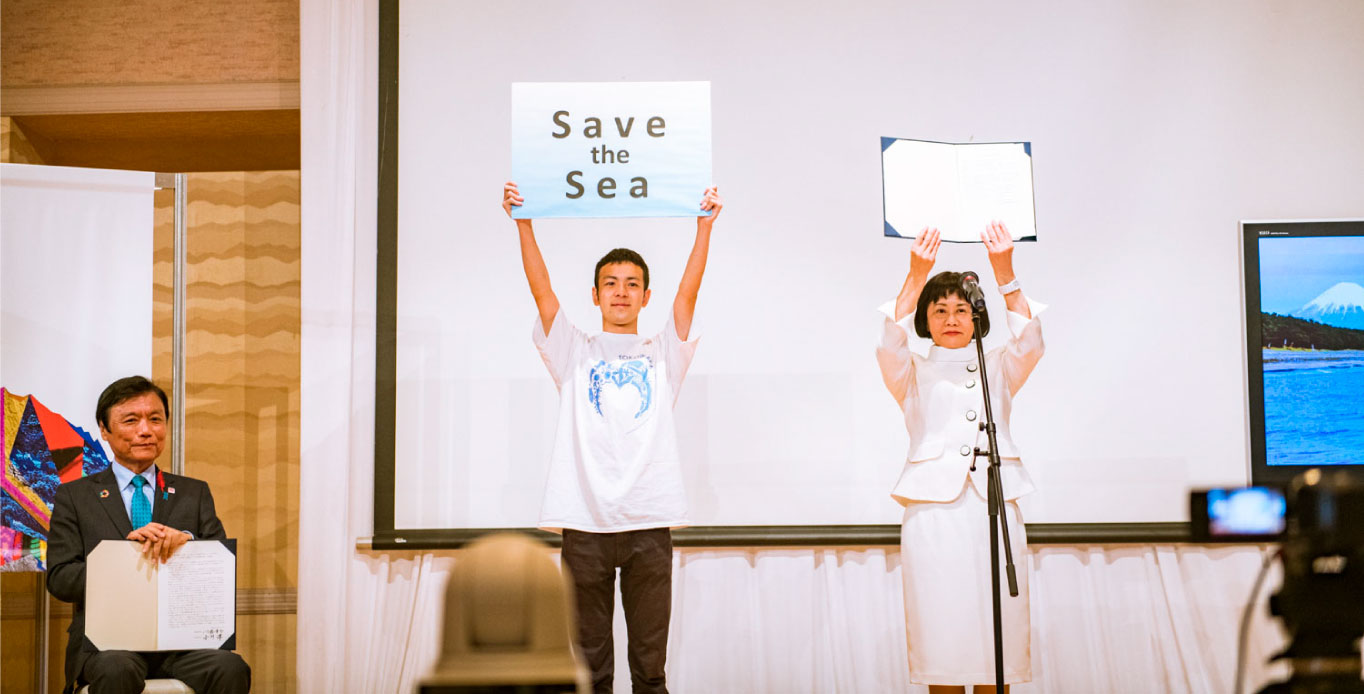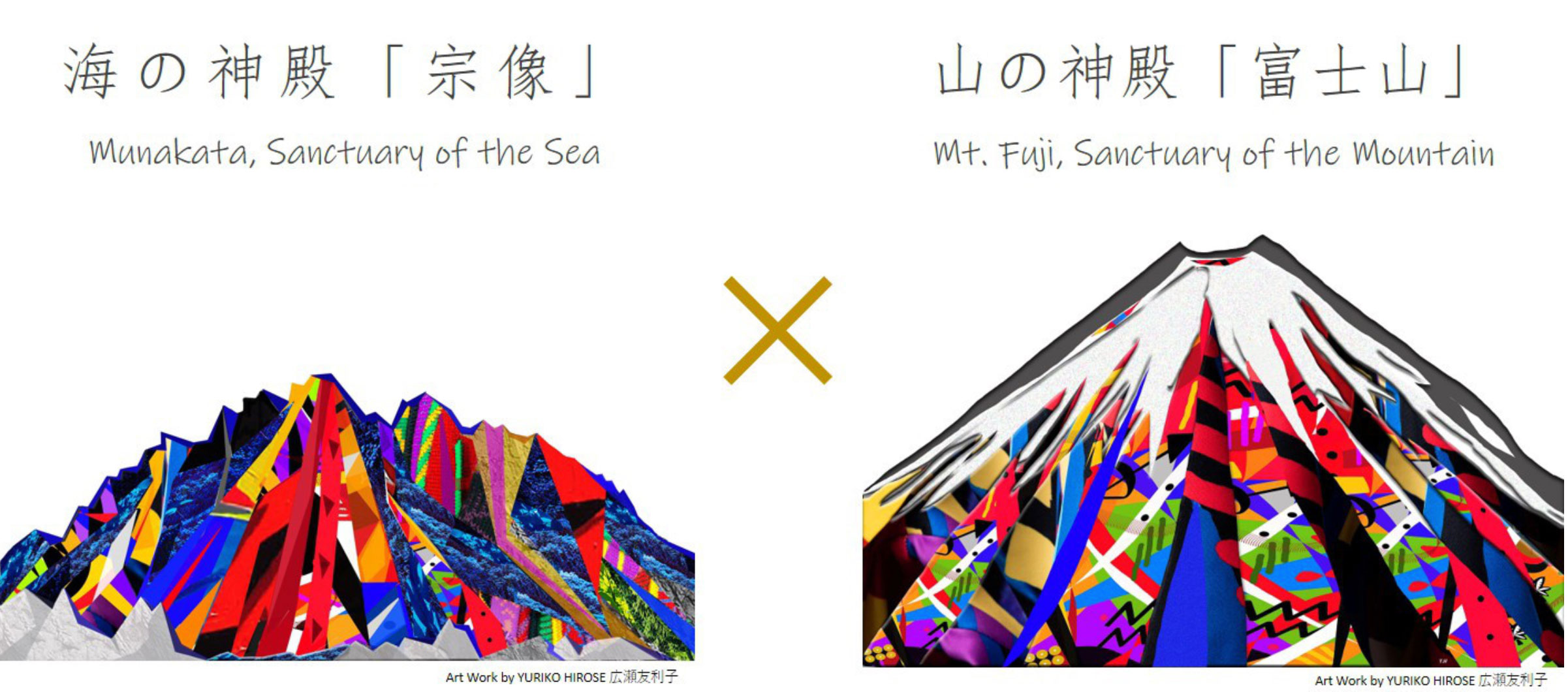Concept
The Munakata Global Environmental Symposium
The Munakata Global Environmental Symposium was established in 2014 to work together with academics, local governments, business, nonprofit organizations, media outlets, and other parties from both Japan and other countries in order to address issues such as loss of kelp forests and coastal contamination by microplastics, caused by rising water temperatures in the Genkai Sea. Seeking to establish itself as a sustainable regional initiative, the Symposium also furthers a concept called “Grove of the Sea” by organizing marine regeneration projects together with local residents and schoolchildren, and by functioning as a globally oriented source of ideas and information in response to the dramatic changes seen in oceans in recent years.
Main Activities

Raising awareness: public lectures and other events at the annual Munakata Global Environmental Symposium

Reviving the sea: building artificial fishing reefs, cleaning beaches

Educating the next generation: organizing the Munakata International Education Program
for local high school and junior high students (around 8 times per year)

Other: publishing and promotional activities
The Munakata Global Environmental Symposium Executive Committee
Munakata City, Munakata Tourism Association, Munakata Fisheries Cooperative Association, Munakata Grand Shrine, Chikuzen Nanaura (Fukuoka 7 Bays Council), Kyushu University Graduate School of Engineering, Fukuoka Prefectural Suisan Marine Studies High School, Kyushu no MURA, Munakata Environmental Group Liaison Council, Kaikaku Project, Kyushu Economic Forum, Kyushu Associations of Independent Entrepreneurs, Shabondama Soap, Kirin Beer, Nippon Steel, Nippon Steel Engineering, TOTO, Japan Airlines, Toyota Kyushu Toyota Production Engineering, NTT West, Mitsubishi Corporation,Rotary International district 2700
The 7th Munakata Global Environmental Symposium

- Theme
- Tokowaka – The Circle of Life and Our Natural Environment
- Date and time
- Friday October 23rd to Sunday October 25th, 2020
- Organizer
- The Munakata Global Environmental Symposium Executive Committee
- Co-sponsor
- The International Cultural Arts Project
- Supporter
- The Ministry of Environment for Fukuoka Prefecture
- Main Event
- (1) Discussion
- (2) Panel
- (3) Fieldwork: Building artificial fishing reefs and beach cleaning
- Related Events
- (1) MUNAKATA ECO FESTIVAL 2020
- (2) Art exhibition “Message from the sea”
- (3) Special Exhibition at Munakata Taisha Shrine, Shinpokan Museum: Treasures for the Gods
Joint Declaration
Munakata-Okinoshima, a Sanctuary of the Sea, and Mt. Fuji, a Sacred Mountain
Two World Heritage Sites Tackling Environmental Issues Together
There are currently 1,121 World Heritage Sites around the globe, but many of these sites and their outstanding universal value are threatened by natural disasters, environmental problems, and armed conflict.
One of the most critical of these threats is the rise in ocean temperatures brought on by global warming, which causes dangerous natural phenomena such as extremely heavy rain and ever more powerful typhoons. Over the past seven years, the Munakata Global Environmental Symposium has worked to revive the marine environment – with 70 percent of our planet covered by ocean, supporting the marine environment is critical. But these issues cannot be solved through the efforts of any one country or region.
The sea and mountains play major parts in Japanese mythology, suggesting that these natural elements have been thought of as important and closely connected since ancient times. In recent years, it has become clear that to protect marine ecosystems, their mountain-focused equivalents must also be taken into account. Marine pollution and global warming are caused not by the oceans, but by us humans who live on dry land. For this reason, any solution will be dependent on each of us rethinking our lifestyles and taking action.
The impact of the Covid-19 coronavirus pandemic on society and the economy has, ironically enough, improved the health of the global environment. The peaks of the Himalayas are visible from India again, and the water in the canals of Venice is clearer than before. We have been reminded of the negative effects of our lifestyle, which is based on mass production and mass consumption. On the other hand, when the city of Tokyo was still known as Edo, it was at one point the most populous city in the world. Nonetheless, its people lived in awe of and in harmony with nature, respecting the natural order. It is said that this lifestyle was underpinned by belief in the supernatural power of the sea and the mountains. This traditional view of nature, rooted in animism, is now being appreciated anew across international society, as seen in the thinking underpinning the United Nations Sustainable Development Goals (SDGs).
As we aim to achieve the SDGs and rebuild our society and economy in the wake of the Covid-19 pandemic, we will base our efforts on the traditionally Japanese view of sustainability called tokowaka, which is one of the major themes of the Munakata Global Environmental Symposium.
From here on, as part of these efforts, our two prefectures that each possess a World Heritage Site – Munakata-Okinoshima, a sanctuary of the sea, and Mt. Fuji, a sacred mountain – will engage in deeper cooperation. This will be accomplished by increasing interactions between our residents, by reevaluating the cultures of sustainability embodied in our respective World Heritage Sites, by debating various initiatives in the context of the new normal, and by communicating actively with the international community.
Signed,
Heita Kawakatsu, Governor of Shizuoka Prefecture
Hiroshi Ogawa, Governor of Fukuoka Prefecture
October 25, 2020

The Munakata Declaration
Abnormal whether phenomena, including extremely heavy rain in Japan attributed to so-called linear rainbands, are becoming increasingly common around the world. The rise in ocean temperatures is one of the causes of these destructive phenomena.
Ocean temperatures are being pushed up by global warming, the effects of which are particularly evident in the relatively shallow Genkai Sea. Geographic factors also make this area vulnerable to pollution, including marine waste washing up on the shores of the sea. The oceans, which cover 70 percent of our planet’s surface, make up a giant ecosystem that sustains itself according to the natural order – as long as we humans do not damage it.
Seeking to uphold and rebuild the circle of life and our natural environment, the Munakata Global Environmental Symposium has highlighted the keywords #Ocean Recovery and #Ecosystem Resilience and debated what a sustainable society should look like. One of the key initiatives related to these efforts is cooperation between two World Heritage Sites: Munakata-Okinoshima (inscribed by UNESCO as “Sacred Island of Okinoshima and Associated Sites in the Munakata Region) and Mt. Fuji (“Fujisan: Sacred Place and Source of Artistic Inspiration”).
As we rebuild our society and economy in the aftermath of the Covid-19 coronavirus pandemic, we should seek not to return to the “old normal,” but to decarbonize society, ending marine pollution at its source, and to restore damaged ecosystems to their natural state, thereby reviving nature itself.
Here in Munakata, we pledge to build a society centered on nature – the source of all life – and to relay this ambition to the entire international community.
Signed,
Participants of the 7th Munakata Global Environmental Symposium, October 25, 2020
The Tokowaka Industries Declaration
The mindset and techniques of Japanese manufacturing have their roots in the idea of tokowaka, or “everlasting youth.” A traditional carpenter first needs fine tools. When he masters the spirit of these tools, they will work in the carpenter’s favor. Techniques are acquired through the training of one’s physical instincts. Knowing the true nature of wood is the key to building a perfectly symmetrical five-story pagoda without measurements or blueprints.
Mechanization and automation may improve the effectiveness of manufacturing, but as artisans who believe that the mind and body are one, when we think about Earth 3,000 years in the future, we come to the conclusion that truly great manufacturing should be done in unity with the land, sea, and sky, and with all the beings that inhabit the forests, mountains, rivers, and oceans.We think beyond the lifespan of physical things, imagining eternal life, and share these values with all the nations of the world.
The spirit of tokowaka unites farming, forestry, fishing, manufacturing, and all the other industries in our society. We pledgeto set an example in this regard, spreading this spirit far and wide. We will seek to increase interaction and cooperation with countries that exhibit an interest in Japanese industry, express our respect to everyone who imbues their industry with the philosophy of tokowaka – whether they are based in a big city or a declining rural town – and take after their example.
Signed,
Participants of the 7th Munakata Global Environmental Symposium, October 25, 2020


